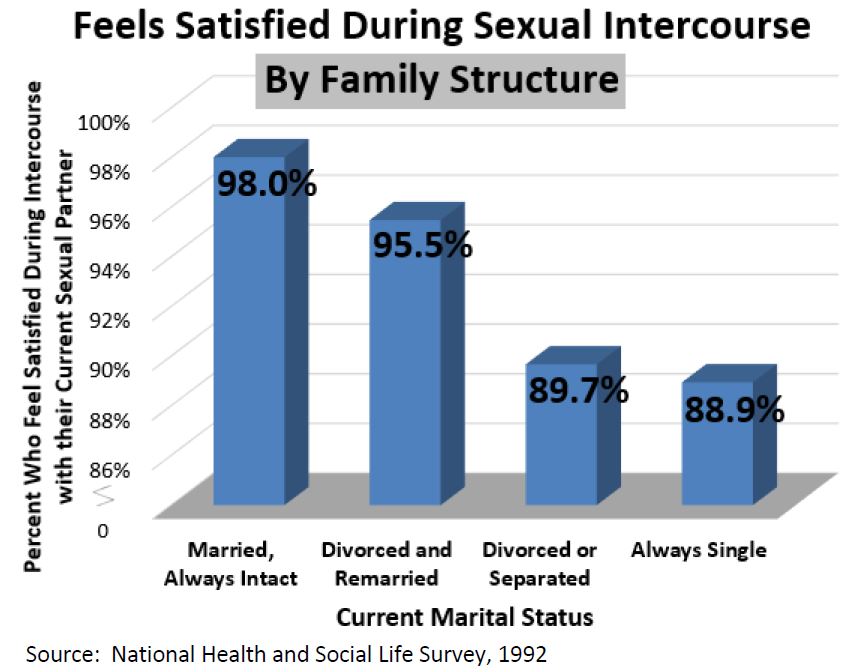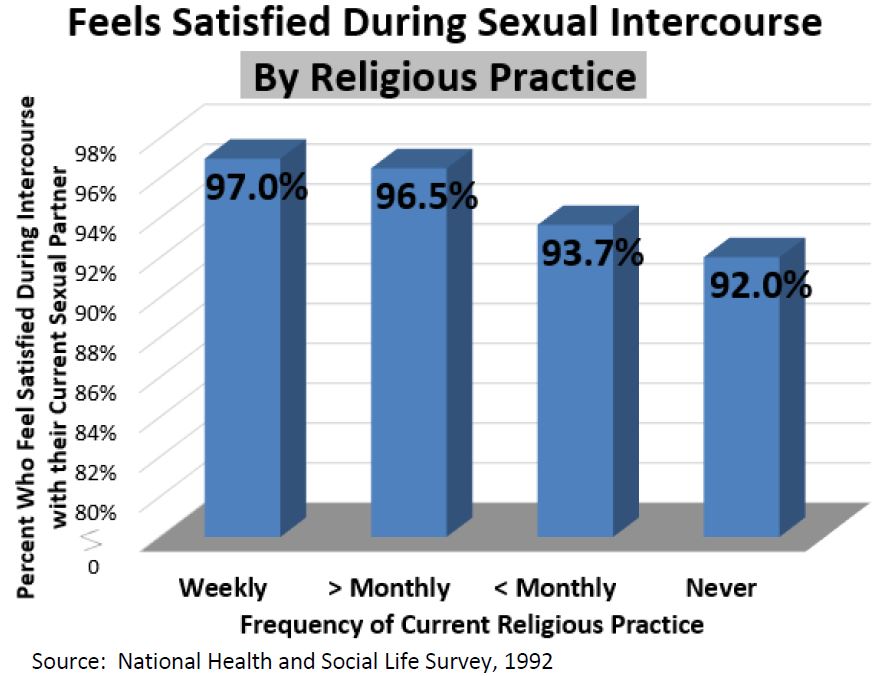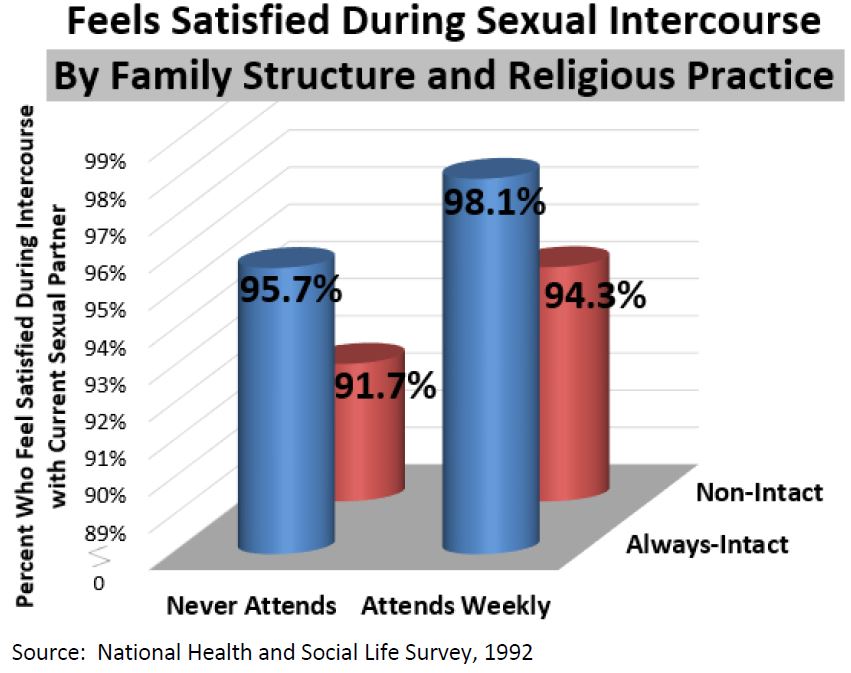Click Here to download “Feels Satisfied During Sexual Intercourse by Family Structure and Religious Practice”
Feels Satisfied During Sexual Intercourse by Family Structure and Religious Practice
Adults aged 18 to 59 in intact marriages and who worshipped weekly were most likely to report feeling satisfied during intercourse with their current sexual partner, according to the 1992 National Health and Social Life Survey.
[1]
Family Structure: Those in always-intact marriages were most likely to report feeling satisfied during intercourse (98 percent). Satisfaction was less common among non-intact family structures and those who were single: 95.9 percent of those who were divorced and remarried reported feeling satisfied; 89.7 percent of those who were divorced or separated reported feeling satisfied during intercourse with their current sexual partner, and 88.9 percent of those who were always single reported feeling satisfied.
 Religious Practice:
Religious Practice: Those who worshiped weekly were most likely to report feeling satisfied during intercourse with their current sexual partner (97 percent). This satisfaction decreased as regular worship decreased: 96.5 percent of those who worshiped less than weekly but at least monthly, 93.7 percent of those who worshiped less than monthly, and 92 percent of those who never worshiped reported feeling satisfied during intercourse.
 Family Structure and Religious Practice Combined:
Family Structure and Religious Practice Combined: Those in intact marriages who worshiped weekly were most likely to report feeling satisfied during intercourse (98.1 percent). Those in intact marriages who never worshiped (95.7 percent), those in non-intact family structures or who were single who worshiped weekly (94.3 percent), and those in non-intact family structures or those who were single who never worshiped (91.7 percent) were less likely to feel satisfied during intercourse with their current sexual partner.
 Related Insights from Other Studies:
Related Insights from Other Studies: Communication within a relationship and sexual satisfaction independently predict overall marital satisfaction. When couples communicate successfully, sexual satisfaction does not greatly increase marital satisfaction. Conversely, if couples do not communicate well but are sexually satisfied, they will experience greater marital satisfaction than if they had a less satisfying sexual relationship. Thus, sexual satisfaction in a relationship may compensate for the negative effects of poor communication on overall satisfaction in a marriage relationship.
[2]
[1] These charts draw on data collected by the 1992 National Health and Social Life Survey
[2] Samantha Litzinger and Kristina Coop Gordon, “Exploring Relationships Among Communication, Sexual Satisfaction, and Marital Satisfaction,”
Journal of Sex and Marital Therapy 31, no. 5 (2005): 409-424.]]>
 Religious Practice: Those who worshiped weekly were most likely to report feeling satisfied during intercourse with their current sexual partner (97 percent). This satisfaction decreased as regular worship decreased: 96.5 percent of those who worshiped less than weekly but at least monthly, 93.7 percent of those who worshiped less than monthly, and 92 percent of those who never worshiped reported feeling satisfied during intercourse.
Religious Practice: Those who worshiped weekly were most likely to report feeling satisfied during intercourse with their current sexual partner (97 percent). This satisfaction decreased as regular worship decreased: 96.5 percent of those who worshiped less than weekly but at least monthly, 93.7 percent of those who worshiped less than monthly, and 92 percent of those who never worshiped reported feeling satisfied during intercourse.
 Family Structure and Religious Practice Combined: Those in intact marriages who worshiped weekly were most likely to report feeling satisfied during intercourse (98.1 percent). Those in intact marriages who never worshiped (95.7 percent), those in non-intact family structures or who were single who worshiped weekly (94.3 percent), and those in non-intact family structures or those who were single who never worshiped (91.7 percent) were less likely to feel satisfied during intercourse with their current sexual partner.
Family Structure and Religious Practice Combined: Those in intact marriages who worshiped weekly were most likely to report feeling satisfied during intercourse (98.1 percent). Those in intact marriages who never worshiped (95.7 percent), those in non-intact family structures or who were single who worshiped weekly (94.3 percent), and those in non-intact family structures or those who were single who never worshiped (91.7 percent) were less likely to feel satisfied during intercourse with their current sexual partner.
 Related Insights from Other Studies: Communication within a relationship and sexual satisfaction independently predict overall marital satisfaction. When couples communicate successfully, sexual satisfaction does not greatly increase marital satisfaction. Conversely, if couples do not communicate well but are sexually satisfied, they will experience greater marital satisfaction than if they had a less satisfying sexual relationship. Thus, sexual satisfaction in a relationship may compensate for the negative effects of poor communication on overall satisfaction in a marriage relationship.[2]
[1] These charts draw on data collected by the 1992 National Health and Social Life Survey
[2] Samantha Litzinger and Kristina Coop Gordon, “Exploring Relationships Among Communication, Sexual Satisfaction, and Marital Satisfaction,” Journal of Sex and Marital Therapy 31, no. 5 (2005): 409-424.]]>
Related Insights from Other Studies: Communication within a relationship and sexual satisfaction independently predict overall marital satisfaction. When couples communicate successfully, sexual satisfaction does not greatly increase marital satisfaction. Conversely, if couples do not communicate well but are sexually satisfied, they will experience greater marital satisfaction than if they had a less satisfying sexual relationship. Thus, sexual satisfaction in a relationship may compensate for the negative effects of poor communication on overall satisfaction in a marriage relationship.[2]
[1] These charts draw on data collected by the 1992 National Health and Social Life Survey
[2] Samantha Litzinger and Kristina Coop Gordon, “Exploring Relationships Among Communication, Sexual Satisfaction, and Marital Satisfaction,” Journal of Sex and Marital Therapy 31, no. 5 (2005): 409-424.]]>
